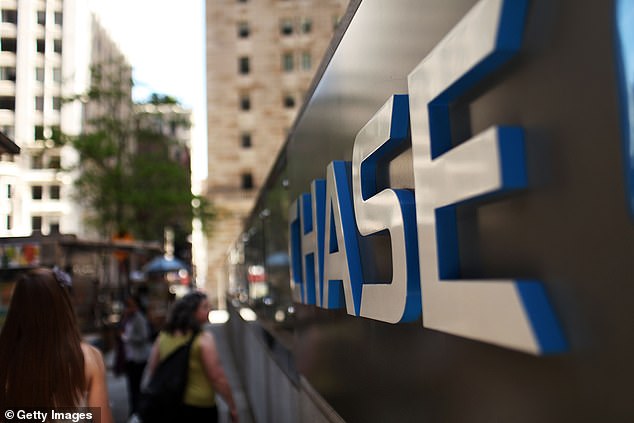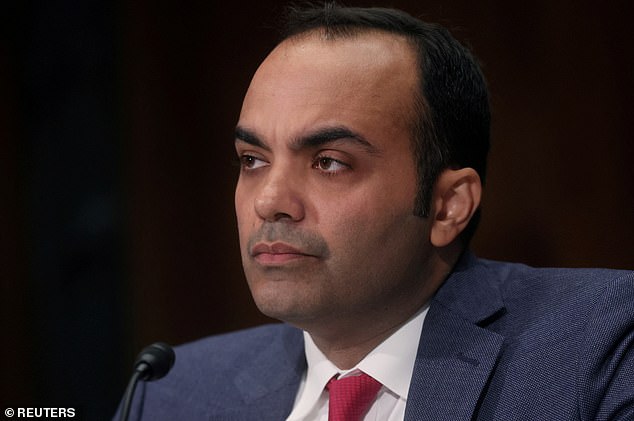Chase to ban credit card payments for controversial service
JPMorgan Chase will ban customers from using its credit cards to pay for controversial “buy now, pay later” loans.
The largest bank in the US has announced that it will no longer be able to accept credit card installment payments from companies such as Klarna, Affirm and AfterPay as of October 10.
Chase has notified customers of the change and advised them to link a new payment method to avoid missed payments or late fees.
The bank said buy now, pay later (BNPL) loans are “a form of credit” and that customers should not use Chase credit cards to pay for credit products. The New York Times reported.
Chase has its own BNPL service, Chase Pay Over Time, and some experts have suggested that the move was likely made to increase interest in its own offering.
JPMorgan Chase bans customers from using its credit cards to pay for controversial ‘buy now, pay later’ loans
Chase Pay Over Time allows customers to split larger purchases over $100 into regular monthly payments.
Customers must use a participating Chase credit card and can pay in six, 12 or 18 installments with no interest, but with a fixed additional amount.
“Chase is doing something that other banks are slowly and methodically implementing: pushing customers to buy their own financial products,” said Alex Beene, a financial literacy professor at the University of Tennessee at Martin. Newsweek.
“The fact that they have eliminated third-party programs indicates that customers who want a similar process will have to use the ‘Pay in installments’ payment option for their purchases going forward.”
American Express and Citibank also have their own BNPL offerings, while Capital One also banned the use of credit cards for 30-day repayment loans in 2020.
Sarah Strauss, head of customer service and strategy at Capital One, said The New York Times that the bank ‘encourages its customers to make responsible decisions when it comes to paying off debts.
“Our long-standing policy has been not to allow customers to pay off other types of debt with Capital One credit cards, including buy now, pay later loans.”
BNPL financing gained popularity with the rise of online shopping and grew dramatically during the Covid-19 pandemic.
While the details vary by company, users typically pay no interest or fees if they pay installments on time, whether that’s in four, six, or 12 installments.
Many lenders advertise that their service is free, but users can face high fees if they miss a payment.
Critics argue that the service providers target vulnerable Americans, putting them at risk of falling further into debt and potentially damaging their credit scores.
Consumer groups have long been calling for stricter regulation of the BNPL sector as defaults on traditional credit cards increase.

JPMorgan Chase said buy now, pay later (BNPL) loans are “a form of credit” and that it will not allow customers to pay for credit products with Chase credit cards

The Consumer Financial Protection Bureau announced a rule in May that would require BNPL companies to offer consumers the same legal rights and protections as credit card issuers (pictured: Director Rohit Chopra)
Regulators and consumer groups frown upon the use of credit cards to repay short-term loans.
If you transfer the required payments to a credit card, users may end up paying a higher interest rate if they carry a balance on their account instead of paying the amount off in full each month.
According to LendingTree, the average interest rate on credit cards is 24.84 percent.
“There’s no point in using a credit card for a buy now, pay later loan,” Lauren Saunders, deputy director of the National Consumer Law Center, told The New York Times. “It undermines the purpose of the loan.”
Earlier this year, the Consumer Financial Protection Bureau announced a new rule that requires BNPL companies to offer consumers the same legal rights and protections as credit card issuers.
This also includes the right to dispute transactions and claim a refund.
“Regardless of whether a customer uses a credit card or chooses ‘buy now, pay later,’ they are entitled to important consumer protections under long-standing laws and regulations,” regulator Rohit Chopra said in a statement.
